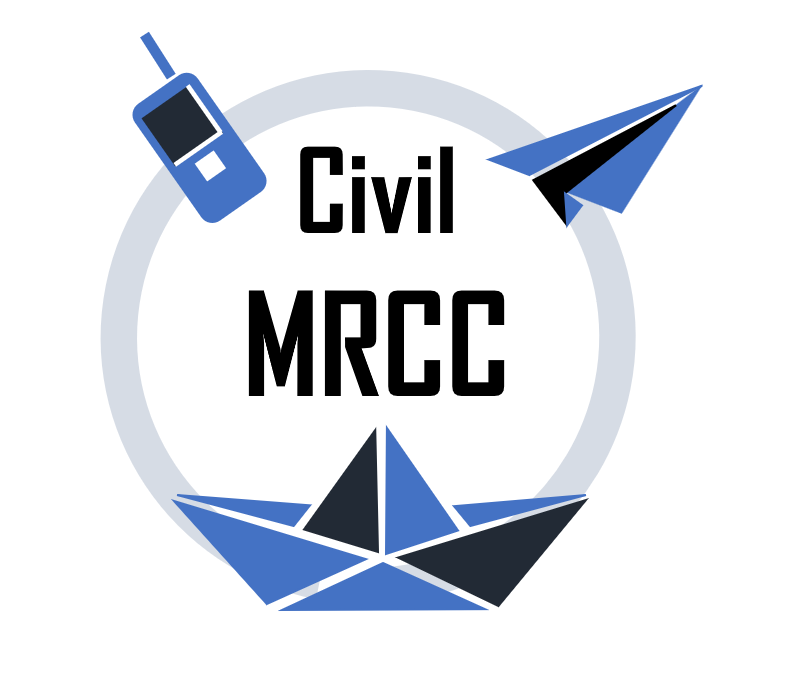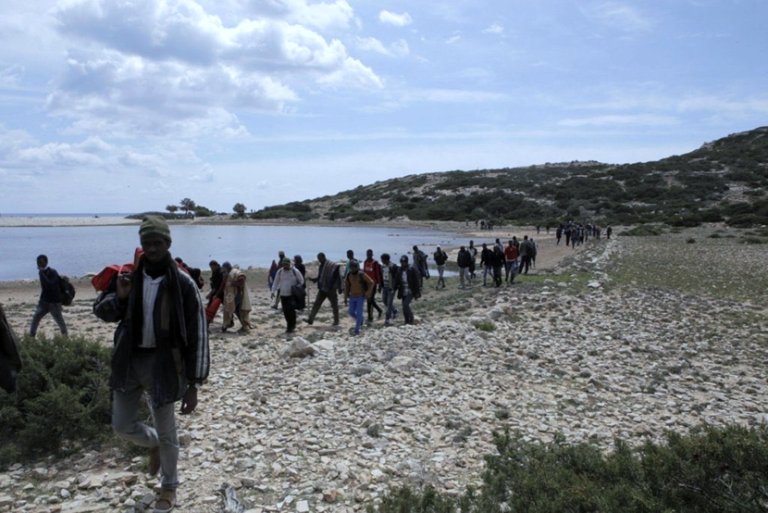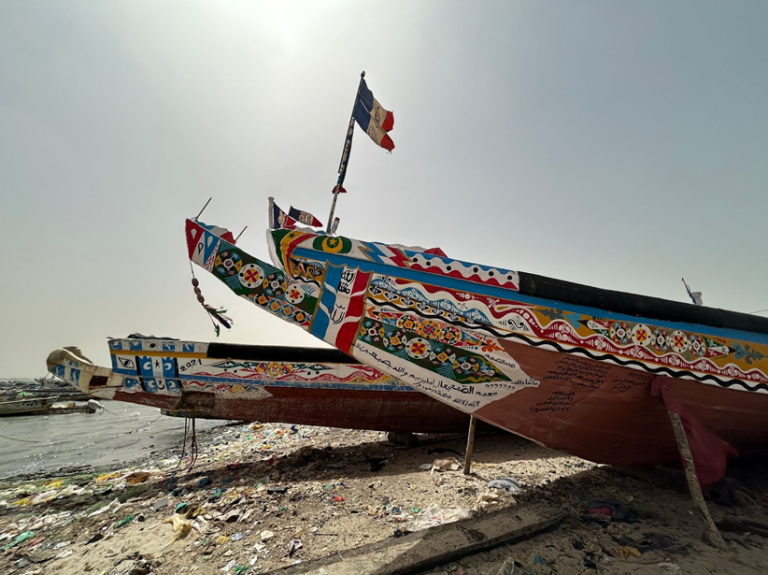Since the summer of 2021, SSA (Stability Support Apparatus) vessels have appeared off the Libyan coast, participating in interceptions and the push-backs of migrant boats to Libya. Made up of various militias from the regions around Tripoli and Zawiyah, this new body has gradually established itself as a key player in border control, and indeed well integrated into the current set of EU migration policies. Infamous for its rights abuses both at sea and on land, the SSA has had a growing presence in the central Mediterranean, putting pressure on both the vessels of the civil fleet as well as the people on the move desperately trying to flee Libya.
The following analysis aims to shed light on the nature of this new actor. It is based upon the testimonies of migrants as well as crew members from NGO vessels, also including press articles, documents published by NGOs and a report published by the UN panel of experts on Libya in May 2022.
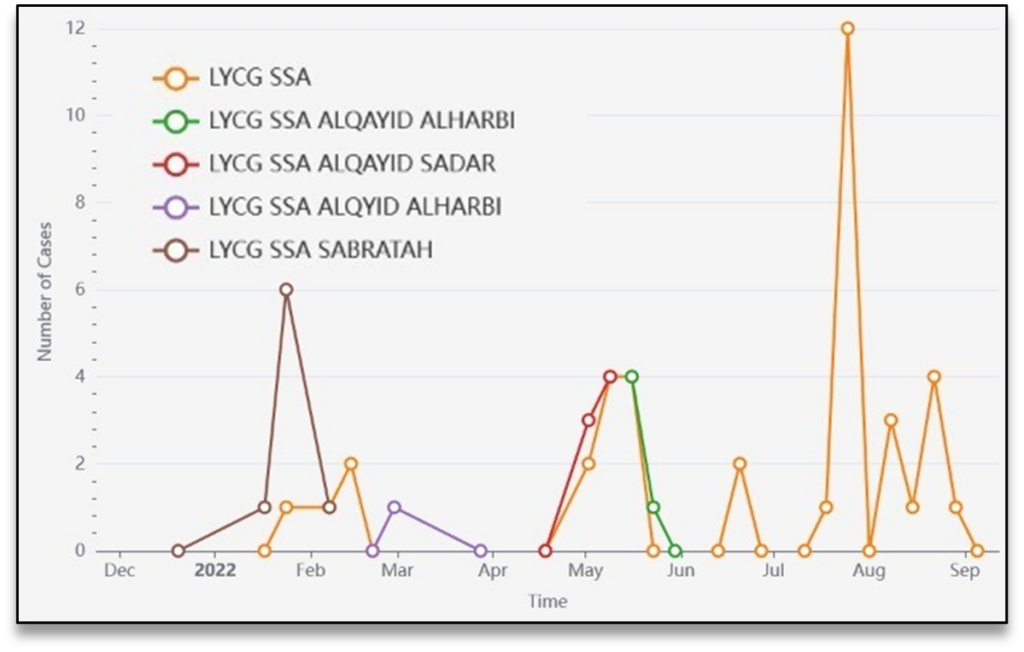
SSA vessels spotted in 2022. Data extracted from SARchive, the CMRCC database. These are only a fraction of likely SSA interceptions which could be properly verified by the CMRCC.
On 12th August 2021, an initial incident involving the SSA was documented by the UN panel of experts on Libya. During the night, “in a supposed law enforcement operation, armed individuals of SSA maritime units used deadly force against migrants located in a boat in waters that survivors claimed to be an hour away from the coast of Zawiya, in violation of their right to life. In particular, SSA individuals performed hazardous movements, including hitting the migrant boat, and firing gunshots at the passengers that caused the death of one person on board.”

On 21st November 2021, an incident occurred involving the SSA which was witnessed by the crew of the civil monitoring aircraft Seabird, operated by Sea Watch and Humanitarian Pilots Initiative (HPI).
Picture: suzanne caroline de carrasco
According to the crew, an SSA vessel now identified as Alqayid 1 was on scene together with a larger patrol boat from the so-called Libyan Coast Guard (scLYCG), as the scLYCG vessel was aggressively attempting to intercept a rubber boat carrying around 100 people in distress. As the people attempted to escape, the scLYCG vessel made several attempts to ram the boat in distress. The boat in distress eventually managed to maneuver itself towards the nearby NGO vessel Sea-Watch 4, where the people could ultimately be safely embarked.

On 19th January 2022, the NGO vessel Louise Michel reported an unknown vessel shooting at a migrant who had fallen into the sea during an interception operation.
This event was first attributed to the Libyan Coast Guard, but the unfamiliar vessel was later recognized as belonging to the SSA (Alqayid Alharbi).
“When we arrived on scene the vessel from SSA was already close to the rubber boat. After some turns around them, they started to pull the people from the boat violently on their deck. After beating the people with sticks, several people jumped into the water which caused the SSA crew to fire several shots into the direction of the people in the water. Later they reported the shots were meant as warning shots towards us. This is just one example of how brutal this group is acting towards people on the move, no matter if people die.”
Louise Michel crew member

A twitter account with ties to the SSA (“Migrant Rescue Watch”) also published a video of this interception a few days later, showing an individual from the SSA assaulting a person in distress. As indicated in the tweet, the intercepted persons were disembarked in the Al Mayah detention center, located 30km west of Tripoli and controlled by the SSA.

On 18th February 2022, a ship belonging to the SSA fired live ammunition at a boat carrying 80 people, killing one and injuring several others. This attack was condemned by the International Organization for Migration (IOM). The SSA denied these allegations outright and called the statements published by IOM “absurd”.

A conglomerate of militias gaining ever more power and legitimacy
On 26th February 2022, the NGO vessel Geo Barents was approached by the same vessel during the night. The SSA vessel claimed to have “intercepted” the Geo Barents.
Created in January 2021 with the involvement of Fayez al-Sarraj, the previous prime minister of the Government of National Accord (GNA), the Stability Support Apparatus is a security body which also bears a law enforcement mandate. Whereas its initial objective was to provide protection services to the Libyan Prime Minister and counteract the previous Interior Minister Fathi Bashagha, the SSA has over time formed new alliances, enlarged its objectives and expanded its influence. Gathering into its scope different militias and armed groups based in Zawiyah, Tripoli and in the region South of Tripoli, it remains a complex and constantly evolving actor.
For over a decade now, Libya has been split between rival administrations in the East and the West, each supported by different militias and foreign governments. The rivalry between these two camps was recently revived after the election of Fathi Bashagha, appointed as Prime Minister by the eastern parliament in March 2022. After this election, a war of influence broke out between the latter and the Prime Minister in office, Abdel Hamid Dbeibah. While Bashagha is supported by the House of representative based in the West (Tobruk) and the Libyan National Army (LNA), Dbeibah is backed by the internationally recognized Government of National Unity (GNU) settled in the East. Since May 2022, forces loyal to Bashagha have attempted to break into the Libyan capital Tripoli, but were so far always defeated by forces loyal to Dbeibah.
The SSA is not exempt from this war of influence. Although officially presented as a unified body, it is divided into two main branches, each of which has recently rallied behind one of the rival Prime ministers:
- the Tripoli branch, led by Abdel Ghani al-Kikli (known as Gheniwa and current head of the Stability Support Apparatus), is largely supportive of Abdel Hamid Dbeibah.
- the Zawiyah branch, mainly influenced by the Abu Zriba brothers (known as Buzriba) and the Al Nasr Brigade, has become closer to Fathi Bashagha over time. A few months ago, Bashagha also appointed one of the brothers, Issam Abu Zriba, as Minister of the interior for his government.
The efforts made by Bashagha and Dbeibah to obtain the support of the SSA demonstrate the importance that the body has gained since its creation in January 2021. By allying itself with both camps, so legitimized by Tripoli as well as being supported by eastern forces, the SSA is securing itself a prominent place within the future government, regardless of the outcome of the conflict. While some of its moves may seem contradictory, this in fact exemplifies the strategy of the SSA to exploit the multiplicity of its allies located throughout the territory in order to gain power.
A competing actor involved in “migration control” in Libya
As indicated on its website, the SSA is divided into four departments, including the « Department for Combating Settlement and Illegal Migration » (DCSIM). The DCSIM presents itself de facto as a parallel and competing body to the official “DCIM”, the “Department for Combating Illegal Immigration” which is under the authority of the Ministry of the Interior. Present within all the main hubs through which people on the move pass, the SSA is involved in intercepting migrant boats at sea, detaining migrants in centers, “dismantling smuggling networks”… On the 18th of June 2022, the SSA also announced a broad operation along the western coast of Libya “to counter illegal immigration”, conducting patrols both on land and at sea.
At sea, the SSA operates in addition to the three other command and control structures carrying out maritime security operations in Libyan territorial and international waters: the Libyan navy and Libyan Coast Guard, under the authority of the Ministry of Defense, and the General Administration for Coastal Security (GACS), under the authority of the Ministry of Interior. According to collected information, the SSA operates at least seven vessels (the following pictures having been sourced from the Twitter accounts “Migrant Rescue Watch” and “SARwatchMED”):
Alqayid Saqar (MMSI number 271047452, registered as “Rustu Kaptan) is based in Al Mayah port and patrols a large area West of Tripoli. It is regularly seen by sea rescue NGOs and is sometimes also observable on vessel tracking applications. The stern is low, easing recovery and man-overboard assistance, and its deck can accommodate a limited number of persons.
Alqayid 1 is a civilian type vessel, built in Turkey. It was not specifically designed for intercepting migrant boats for return, mainly owing to its limited passenger and life-saving equipment capacity. Alqayid 1 has been observed both with and without a heavy machine gun mounted on its bow. It is also based in Al Mayah port.
Alqayid 2 has a specification close to Alqayid 1. It was involved in the 12th of August 2021 incident during which a migrant boat departing from Zawiya was intercepted by the SSA unit. According to surviving eyewitnesses, the SSA repeatedly rammed their boat and shot at the passengers, resulting in the death of one person on board.
Alqayid Alharbi, is a naval type fast patrol boat. The same model “Lambro Olympic D74 / Javelin 74” was also used by the Hellenic Coast Guard. The vessel was involved in the violent 19th January 2022 interception witnessed by the Louise Michel crew, and later also threatened the Geo Barents crew on the 26th of February.
At least three further unidentified vessels are presented as belonging to the SSA by the Twitter account “Migrant Rescue Watch”. The first picture shown here was taken in Al Mayah port, the second during an interception operation conducted on 21 October 2022.
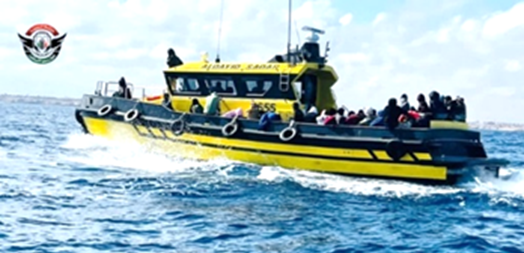

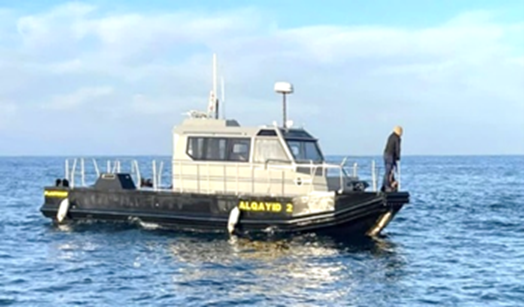


The UN panel has written to Greece in order to establish the supply chain regarding the vessel Alqayid Alharbi. The transfer of such a military vessel to Libya would constitute a clear violation of the arms embargo currently in force for the region. Whereas some civilian models have been observed with heavy machine guns mounted on the bow (Alqayid Saqar, Alqayid 2), the panel pointed out that these modifications could also constitute a violation of the embargo.
Most of the described vessels are based in the port of Al Mayah, which appears to have been built recentely. Located around 30 kilometers west of Tripoli, this port is close to a large detention center, also controlled by the SSA, built at a repurposed pharmaceutical factory. According to the last report written by the UN expert panel on Libya, the SSA controls three such facilities: Al-Mayah, Al-Zahra and Az-Zawiyah Al Nasr detention centers.
According to the same report, as of March 2022, the DCIM controlled nearly 24 official detention centers throughout Libya, while the DCSIM appears to have had control over only a very small number of centers. However, according to various sources, the centers under DCSIM’s control have the capacity to hold a much larger number of migrants. In February 2022, in a video posted on its social networks, the SSA stated that more than 8.000 people were detained in Al Mayah. These figures though should be treated with caution: no doubt it is in the interest of the militia to show that it controls more migrants than others, as migration control remains an important stake in terms of gaining recognition from both State and international actors. The organisation Libya Crimes Watch estimates that around 1.800 migrants are actually detained in Al Mayah.
A network of criminals, involved in multiple rights violations
The SSA has become infamous for its direct involvement in countless rights violations, not only at sea but also on land. Most of its leaders are themselves already known at national and international levels for the abuse they have perpetrated. Gheniwa, the head of the SSA, has been accused by both Amnesty International and the UN Security council of war crimes and other rights violations against the local and migrant population during the last decade. Leading a powerful armed group in the Abu Salim neighborhood (Tripoli), there were numerous testimonies of torture, sexual violence, deprivation of rights and killings resulting from the violent practices of the militia. All of these violations were then legitimized by the integration of Gheniwa’s forces into the departments of the Minister of the Interior and then the SSA.
Alongside Gheniwa, the Al-Nasr brigade (active within the SSA branch controlling the Zawiyah area) is also known for its mistreatment of migrants and its human trafficking and smuggling activities. Among the most famous figures in the Al-Nasr Brigade is Mohamed Koshlaf, dominant in the fields of migrants and oil smuggling in the Zawiyah region. He cooperates closely with Abd al Rahmane Milad, nicknamed “Al-Bija”, the head of the local unit of the coast Guard of Zawiyah, who was placed on a UN Security Council sanctions list in 2018 for his involvement in human trafficking in Libya. According to the UN panel of experts, al-Bija’s crimes include “directly participating in scuttling migrant boats with firearms”. Though Al-Bija was arrested in October 2020, he was released in April 2021, “due to a lack of evidence” and has since regained his influence among the Zawiyah Coast Guard.
Al-Bija’s cousin, Osama al-Kuni Ibrahim, is known as the de facto director of the Al-Nasr detention center in Zawiya, also called the “Osama prison”. Despite the fact that it was for a long time under nominal DCIM control, the Al Nasr center has always been operated by the Al-Nasr Brigade and is now clearly under SSA control. This detention center works closely with the Zawiyah Coast Guard. After their interception at sea, migrants are taken to the center, where they are subjected to torture and extortion and where some are also sold to other detention sites, including Al Mayah detention center. In 2021, the UN also imposed sanctions on Osama al-Kuni for carrying out “horrific abuses” on migrants in Al-Nasr, including killings, sexual violence and beatings.
The Al Mayah detention center does not have a better reputation. On January 2022, the organization Libyan Crimes Watch published a report on the center describing deplorable conditions (including overcrowding, lack of ventilation, migrants forced to drink water from toilets and violence from guards). The report also confirmed that 3 Moroccan people were tortured and killed while they were detained in the redesigned pharmaceutical factory. According to testimonies collected by the UN experts, the prison’s chief, Mohamed al-Kabouti, was personally involved in beating detainees.

On the 30th of March, several organizations denounced the death of Samy, who also died as a consequence of being tortured in Al Mayah after being intercepted at sea.
A body without accountability at the service of the EU’s deadly migration policies
Although the links between the SSA and the European Union are still blurry, it is clear that the militia serves the interests of EU member states, fulfilling the main objective of their migration policies: to prevent migrants from reaching European shores at all costs. The SSA Coast Guard does not receive direct funding from the EU, as these funds are theoretically reserved for officially recognized partner authorities: the so-called Libyan Coast Guard and the GACS (Ministries of Defense and Interior).
However, this does not prevent the SSA from receiving European funds indirectly. According to a former head of the so-called Libyan Coast Guard anonymously interviewed by the Associated Press, the SSA indirectly draws money given by the EU, while being funded by the Tripoli based government. Amnesty international wrote in its report that “the Government of National Unity’s (GNU) 2021 proposed budget allocated 40 million LYD (8.9 million USD) to the SSA, of which 5 million LYD (1.1 million USD) was for payroll. Additional ad hoc payments also take place: in February 2022, GNU Prime Minister Abdelhamid Debibah authorized a payment of 132 million LYD (around $28 million) to the SSA.” Since 2015, in a bid to stem migration along the central Mediterranean route, the European Union has given the government in Tripoli more than $500 million.
In addition to this public funding, the SSA also benefits from illicit activities related to human trafficking, smuggling and extortion in the detention centers they control. As has been demonstrated for the so-called Libyan Coast Guard, the SSA receives funds both to organize boats to Europe and to intercept them. This link is particularly visible in Al Mayah, where migrants report going directly from the port of disembarkation to the detention center before being forced to pay to be released and then potentially try their luck at sea again. Similar testimonies were collected regarding the Al Nasr detention center. UN agencies and other actors such as Médecins Sans Frontières do not have access to these detention centers, nor to the disembarkation port of Al Mayah, a lack of access which makes the SSA even less accountable for their criminal activities and ill-treatment of migrant
As for the link between the SSA and the EU, another question arises: how is it that the SSA manages to intercept migrant boats when, theoretically, it does not have the surveillance resources made available by the EU through the Frontex agency and Irini military operation? The answer is likely to be found in the proximity between the Coast Guard of the oil refinery port in Zawiyah, which benefits from European support, and the local branch of the SSA. Close to both the Zawiyah Coast Guard and the SSA, Al-Bija and more broadly the Al-Nasr brigade may be the link between the EU and the SSA, having the ability to share Frontex data with the SSA in order to facilitate interceptions at sea.
A navy official interviewed by the Associated press confirmed that in Zawiyah, the Coast Guard unit “virtually belongs to [SSA] and that it was “a separate unit in name only”. Another naval official added that the SSA vessels were maintained by the navy, which benefits from EU funds and confirmed that the Apparatus has also become involved in the continual coordination between Libyan naval authorities and Frontex.
In spite of its criminal composition and recurring involvement in human rights violations, the SSA has risen to become one of the main forces carrying out EU border control policies. Unlike the Coast Guard and navy, the SSA reports directly to Libya’s Tripoli-based presidential council and is not subject to EU and UN scrutiny. Whereas this scrutiny proved to be helpless (or simply not used by the EU) to prevent rights abuses, the total impunity enjoyed by the SSA is highly concerning.

Google Maps screenshot
It is of no doubt that the EU is also benefiting from the operational fragmentation of entities in charge of the maritime interceptions in Libya (between the so-called Libyan Coast Guard, the GACS and the SSA), at the expense of migrant rights. As emphasized by the UN Panel, “[d]ifficulties in identifying the appropriate Libyan maritime agency placed migrants and asylum seekers at a real risk of serious human rights violations and eroded prospects for accountability in relation to reported human rights violations”.
In recent months, the SSA has put a high level of effort into presenting itself as a reliable actor and acceptable partner on the national and international scene. On its website, the Apparatus displays its commitment to a united, secure and rights-respecting Libya. On the 20th of December 2021, the SSA also participated in the activities of the national symposium against torture held in Tripoli. Following a statement published by Amnesty International in May 2022 entitled “Libya: Hold Stability Support Authority militia leaders to account”, the SSA dismissed all allegations of abuses against migrants. Shortly before, the SSA had posted a video on Facebook purportedly shot in the Al Mayah center, showing smiling and relaxed migrants enjoying the many amenities offered by the center (treatment areas, a spacious dining room, a classroom for children, a gym …). This colorful atmosphere stands however in stark contrast to the painful testimonies of the people who have stayed in the center and the dozens of deaths which have been reported as taking place within its walls …
Whether it is the SSA or the so-called Libyan Coast Guard, the Civil MRCC will continue to document and denounce violations committed at sea and on land by the militias which the EU entrusts with controlling its borders.

Picture: SSA Facebook page, January 2022
Sources
- Samy Magdy, “A new Libyan force emerges, accused of abusing migrants”, AP News, 22 July 2022
- Fabio Papetti, “SSA, i nuovi predoni della Libia”, Irpimedia, July 22, 2022
- Amnesty international, “Libya: Hold Stability Support Authority militia leaders to account”, 4 May 2022
- UN Libya experts, Final report of the Panel of Experts established pursuant to resolution 1973 (UN Security Council, 2011) concerning Libya, 27 May 2022
By Sophie-Anne Bisiaux and Reece Marlowe
